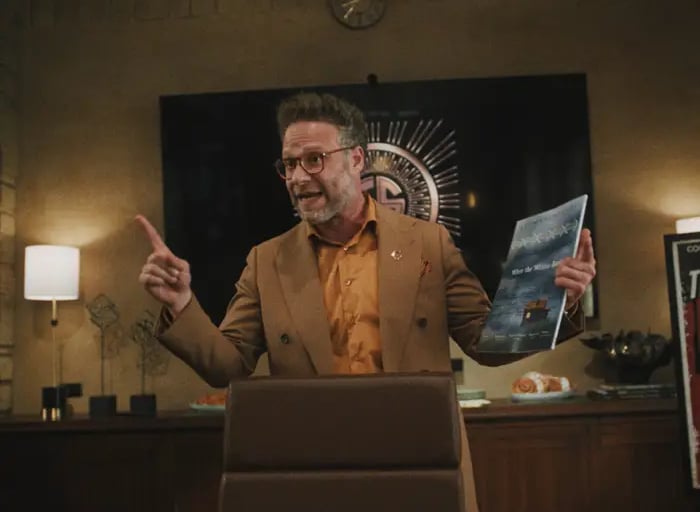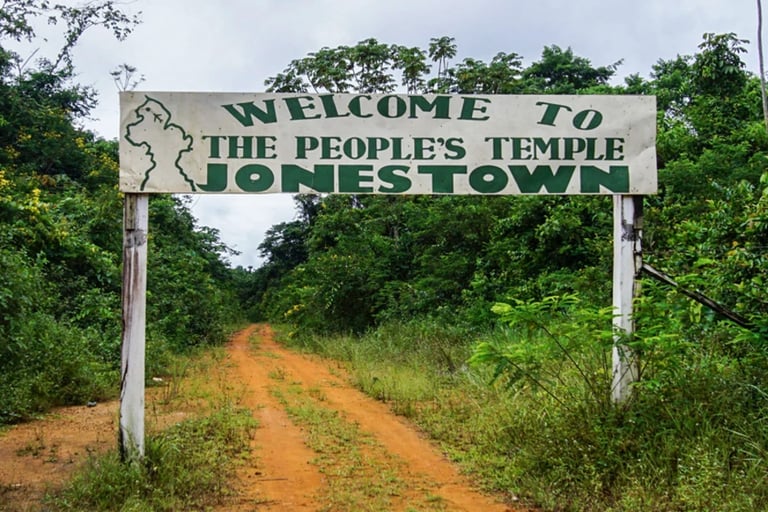Review: “Kool-Aid” Episode — The Studio
Get the Scorpion Scoop on the pilot episode of fellow actor and weed connoisseur Seth Rogen's newest Apple TV+ show
TV
Valicia Carmen
5/1/20255 min read
As a first-generation Guyanese-American creative, watching the “Kool-Aid” episode of The Studio felt disturbingly familiar. Not because of its absurdity, but because of how sharply it satirizes the realities of power, permission, and the commodification of storytelling in the entertainment industry. The Apple TV+ satire, created by Seth Rogen, Evan Goldberg, Frida Perez, Peter Huyck, and Alex Gregory, came out a few weeks ago is known for its hyperbolic portrayal of a Hollywood studio in creative crisis. I watched its pilot episode, centered on the idea of turning the Jonestown massacre into a studio-backed prestige project, and I feel like it edges uncomfortably close to real-world dynamics and is actually not that absurd.
In the episode, the fictional studio, Continental, owns the rights to Kool-Aid and hopes to replicate the success of Barbie by leveraging a well-known brand to create a box office hit. But as the characters in The Studio point out, comparing the Kool-Aid Man to Barbie in terms of intellectual property is far-fetched. The Kool-Aid brand doesn't carry the same emotional, cultural, or narrative weight. A tangible doll holds far more intrinsic impact than a fruity beverage consumed on a hot summer day. A Barbie doll carries physical presence, imaginative potential, and emotional attachment often tied to formative memories of identity, aspiration, or play. People are much more likely to remember and connect to their first Barbie than their first sip of Kool-Aid. One represents a lasting symbol of childhood and self-expression; the other is fleeting, momentary, and ultimately consumable. That distinction underscores why the comparison in the show and by extension, in real life is both comical and revealing of how studios often chase branding over substance. The resulting satire critiques both Hollywood’s obsession with intellectual property and the opportunistic repackaging of human tragedy. The plot centers on the studio’s failed effort to greenlight a Jonestown project through Martin Scorsese, whose passion is ultimately stifled by corporate discomfort.
For me, the Jonestown tragedy is not provocative material or edgy terrain. It is history. Jonestown took place in Guyana, an opportunistic move by a sadistic cult leader. More than 900 people died, many of them Black, many of them poor, most of them manipulated under the guise of salvation. The phrase “drinking the Kool-Aid” has entered the American lexicon as a glib idiom, used casually and carelessly. It wasn't even Kool-Aid that was used. It was Flavor Aid. The show briefly acknowledges this fact before swiftly brushing it aside, a moment that underscores a deeper truth. The slippage between “Kool-Aid” and “Flavor Aid” is not trivial, it is emblematic of the way complex histories are reduced, rebranded, and repurposed for mass consumption.
Accuracy matters, and the "drink the Kool-Aid" mythology is simultaneously pervasive, inaccurate, and deeply insensitive. Correcting the record is essential not for the sake of semantics, but for historical integrity and human dignity. The residents of Jonestown were not joyfully participating in a cult ritual. They were scraping by on the brink of starvation, eating frugally, and could not afford name-brand Kool-Aid; the drink used was actually Flavor Aid, a cheaper knockoff. More critically, the event was far closer to an act of genocide than a voluntary mass suicide. Many were coerced, forcibly injected, shot, or manipulated under extreme duress. To casually invoke this phrase without reckoning with the human horror it references is to actively participate in the erasure of one of the most tragic episodes of the 20th century.
What the episode captures effectively is the internal calculus studios make when evaluating work by artists of color or stories rooted in trauma. These narratives are often deemed too risky or too niche until someone finds a way to package them in something familiar, something palatable. This is not a theoretical exercise. I have spent years developing a project titled Kool Aid, not because the title is provocative but because the legacy is personal. I know what it means to process grief and diaspora through art. I understand what it feels like to navigate a creative landscape where the story you need to tell is weighed against marketability.
In The Studio, the fictional Scorsese film is shelved not because it lacks merit, but because it makes the gatekeepers uncomfortable. That tension between vision and liability is central to the episode. It reveals how artistic expression is often diluted or dismissed in the face of institutional risk-aversion. The show is comedic, but its implications are sobering. It is a narrative about the forces that shape what is allowed to be made, who is allowed to make it, and at what cost.
Now, nearly a decade later, HBO is trying again. The Variety article announcing the new Bill Hader project opens with the line, “Turns out Bill Hader has been drinking the Kool-Aid.” It is a striking choice of words, one that underscores the very problem The Studio is satirizing. When language becomes careless, history is reduced to a punchline. It’s ignorance, I don't believe anyone who uses the phrase to be malicious at all, just uninformed. Most people don’t really know the history behind the saying and if they do, they often carry an obscured, inaccurate version of the events that transpired at Jonestown. Without that clarity, it becomes harder to empathize with the victims or recognize the weight of the phrase. I hope to reeducate, not to shame, but to restore the gravity of a tragedy that has too often been trivialized. I hope to create work in the future that at least makes people think twice before they use that phrase. Now if you know the history and still inject that phrase into your everyday language, I don't know what to tell you.
This is also not the first time HBO has shown interest in a Jonestown-centered project. In 2016, Vince Gilligan, coming off the success of Breaking Bad, was set to develop a limited series titled Raven, based on the nonfiction book Raven: The Untold Story of Jim Jones and His People by Tim Reiterman. The project was to be directed by Michelle MacLaren and executive produced by Octavia Spencer, who had optioned the book. Unfortunately that series never came to fruition but the effort confirms that Jonestown remains a recurring object of fascination within the industry, particularly for major creatives eager to explore its darkness, but would they be able to confront the cultural and geographic specificity of its setting accurately?
The Studio offers an incisive, unsettling mirror to the industry it mocks. As a Guyanese-American, I hope future adaptations of Jonestown reckon with the legacy in full. And if the industry is truly seeking someone who understands the history and has something meaningful to say, they do not have to look too far (I'm over here!)
Love always,





